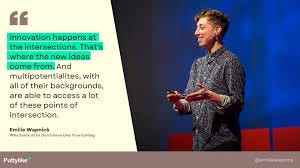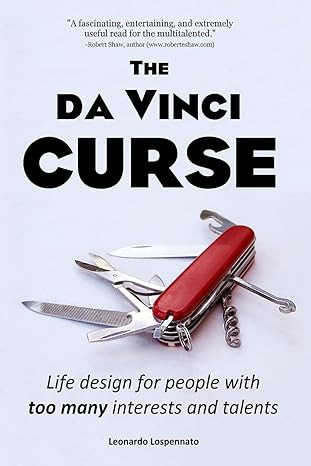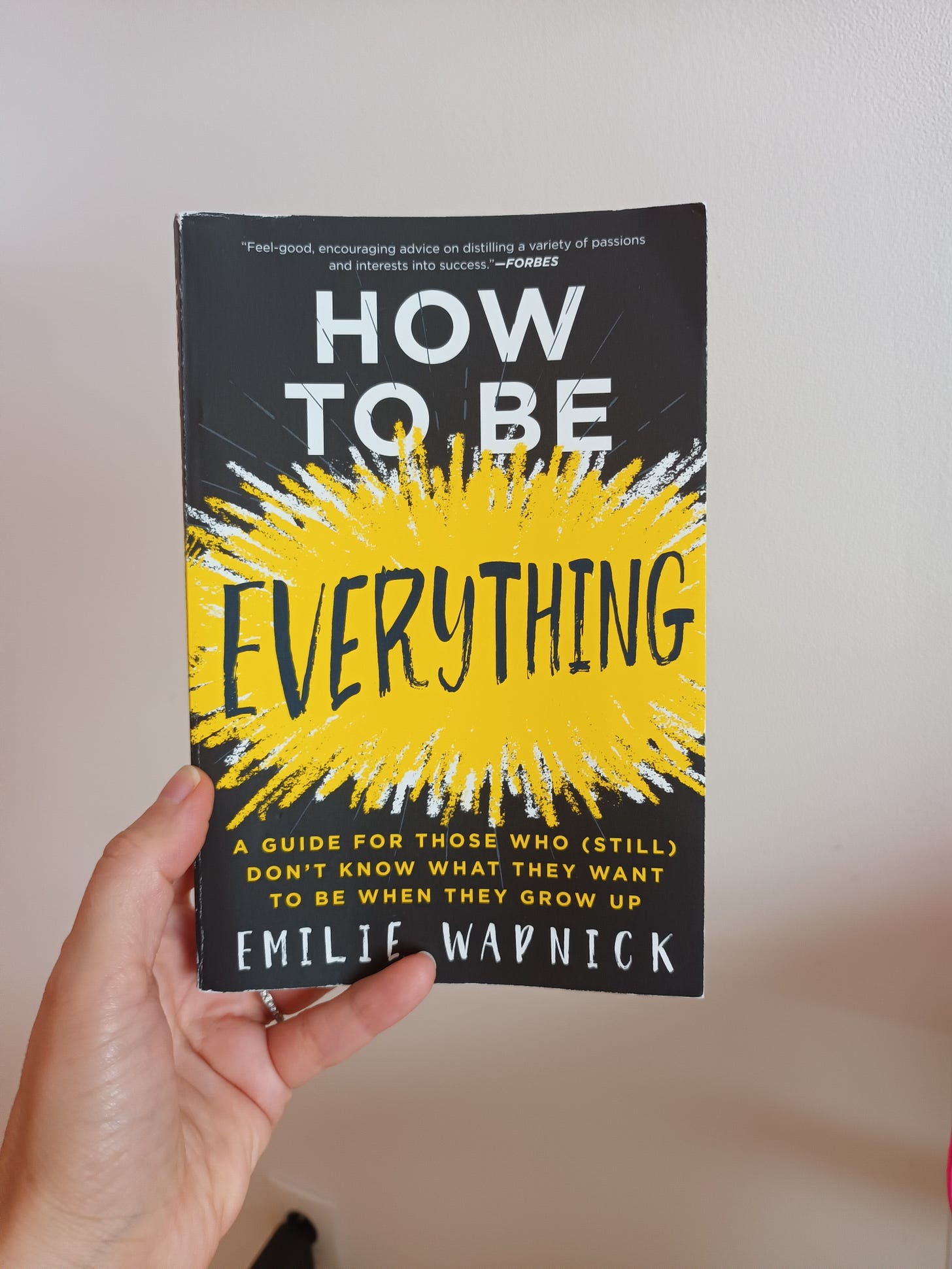What if you were a multipotentialite without knowing it?
Take the test to find out
"What's your passion?"
While my girlfriends answered, with stars in their eyes, "I love dancing" or "I'm a fan of New Kids on the Block" (yes I'm old 😉 ), I couldn't think of an answer. No, that's not true. I found lots of answers.
I've always liked several things at the same time... which I tire of more or less quickly.
I've just realised that I'm not abnormal. I'm simply a multipotentialite. Take the test at the end of this newsletter and find out if you could be too.
Hello, I'm Anne Bezon, a writer, a writing coach and a coach. My mission with this newsletter is to inspire and encourage you to write the life that's right for you, without worrying about society's diktats.
To follow me on social networks -> Instagram and LinkedIn
To become a partner of this newsletter -> hello@annebezon.com
What is a multipotentialite?
I'm always very divided about creating labels.
😈On the one hand, you run the risk of putting people in boxes (and if you know me, you know I hate that)
😇On the other hand, putting a word to what you feel - especially when it's a difference or an unhappiness - can really help you accept yourself.
Anyway.
The term multipotentialist first appeared in 1972 in research into giftedness by H. Frederickson, who said that
"when in an appropriate environment, he [the multipotentialist] allows himself to select and develop a certain number of skills to a high level*.
*Note the word 'high', which is very important and makes all the difference between a multipassionate and a multipotential person. Clearly, just because you like doing Sudoku in your bath, paintings by numbers and playing tennis on Sundays with your mates, that doesn't mean you're multipotential. To be multipotential, you need to achieve a high level in each activity.
Other people have used the term multipotentialite but it was popularised by Emilie Wapnick in 2015, in her TED talk, Why Some of Us Don't Have One True Calling.
Several terms can be used to describe the same thing:
- Polymath which comes from the Greek word meaning "many" (poly) and "learning" (mathe).
- Renaissance person
- Scanner (Barbara Sher's expression)
- Generalist
Make your choice!
Generalists vs Specialists: who wins?
The idea of a person with several strings to their bow is not new. You already know plenty of multi-talented people. Yes, you do! Remember your history lessons.
Leonardo da Vinci: painter, show organiser, scientist, engineer, sculptor, inventor, anatomist, architect, town planner, botanist, musician, philosopher, writer (you can catch your breath 😉 )
Benjamin Franklin: American printer, publisher, writer, naturalist, humanist, inventor, abolitionist and politician.
Mary Somerville: mathematician, astronomer, geographer, metereologist, physicist.
Ada Lovelace: mathematician, inventor of the first computer programme (no less!)
N.B: As usual, it's harder to find examples of women polymaths, not because there are fewer of them than men, of course, but because history is biased. But that's another debate...
I don't know about you, but when I see what these people have achieved, I think to myself: incredible! Extra-ordinary! Who wouldn't love to work with such geniuses?
Yes... but no. It's not that simple.
In the past (particularly during the Renaissance), such profiles were held in high esteem, but this is no longer the case in our society, which favours specialists. The author Leonardo Lospennato (himself a multi-talented engineer) has written a book with this evocative title:
The Da Vinci Curse
Why is it a curse?
There's this expression that goes "jack of all trades, master of none".
If you're ever wondering, yes, it is pejorative. In many languages, you'll find equivalent expressions warning against the dangers of spreading yourself too thin.
The message is clear: you need to specialise!
If you're in the entrepreneurial world, you've probably heard this message about ten thousand times:
Find your niche!
All the big gurus will tell you over and over again: you have to specialise if you want to attract lots of customers and make lots of money. And if you don't? The universe explodes! 💣 No, I'm joking (although listening to some people...). If you don't niche, you run the risk of spreading yourself too thin, confusing people and therefore ending up on the street, forgotten by everyone. No, I'm only joking. Although.... 🥲
And it's not just the marketers who tell you this. Your parents and society also play this game as soon as you are asked the question: what do you want to be when you grow up?
In other words, you have 1 career choice. You better choose wisely!
So obviously, when you don't have just one passion, when you love lots of things and you have many talents but you get bored quickly, faced with this injunction, you can only feel at best frustration and at worst real dismay.
“Multis" often think that they need to "grow up" and find their "vocation", a profession that they can keep for the rest of their working lives. Because they don't 'grow up', they think they are in a permanent state of failure.
Here's the sad reality: instead of celebrating their multiple talents, multi-talented people are often ashamed of themselves.
Real suffering
This summer I went through a difficult period - from which I haven't quite emerged, in fact. I found myself in the same situation I was in 4 years ago when I left the French state education system, but also 7 years ago when I was obsessed with the idea of no longer being a teacher, and also 20 years ago when I started as an English teacher: an immediate weariness accompanied by an enoooooormous guilt.
Why can't I be like everyone else? Why do I never know what I want to do? Why do I get bored of everything?
This feeling that sticks with me of never seeing things through to the end, of giving up, of being unstable. I have bursts of enthusiasm that quickly fizzle out. One day, I set up a course to tame LinkedIn, which I abandoned as soon as the first sales were in my pocket. I trained in copywriting, only to declare that I was no longer interested in it and to turn my attention to writing books. I love LinkedIn. I hate LinkedIn. I design jewellery. I don't want to do it anymore.
Faced with too many choices, I'm often paralysed. I waste time by spreading myself too thin. I procrastinate when the stakes get too high. I have the impression that I'm skimming over everything but getting nowhere.
"Multipotentialites tend to struggle with three main areas: work, productivity, and self-esteem.
Emilie Wapnick in her book How to Be Everything Today, thanks to re-reading Emilie Wapnick's book, I am beginning to understand that I am not abnormal. My work of acceptance has begun.
My work of acceptance
🌟I'm looking for my guiding principle
What do all my past and present activities have in common? For me, it's my WHY: helping people (especially women) to write the life that suits them without worrying about society's diktats. If an activity fits into my WHY, then I keep it. If it doesn't, I may choose it for the wrong reasons (fear of running out of money, other people's opinions, etc.).
🌟 I accept the disadvantages of being multi
I have to accept that sooner or later I'll get bored or change my mind and that's OK. As you can't ask me to become blonde by my own will, I can't change that aspect. I can anticipate it so that the transitions between different activities go smoothly, but there will be transitions. I might as well not fight it.
🌟 I'm preparing my answer to the question "what do you do for a living?"
This summer, when I got lost, I suddenly felt really bad about not having a ready-made answer to this very simple question that nonetheless says a lot. Rather than getting anxious and stammering when it came time to answer, I prepare my answer.
🌟 I'm getting help
I'm working with an NLP coach (Hello Séléna) who is herself multipotential, helping me to accept myself but also to be concrete by thinking about potential careers, without putting barriers in my way. There's still a lot of work to do, but I'm making progress.
🌟 I accept that I don't fit into a box
I'm fighting to pass on this message to the people I come into contact with, but I still have a tendency to want to fit into these boxes that aren't made for me! That's the last straw! I will continue to fight against my fears, those that push me back towards the known. If only to show my 2 boys the way...
In a forthcoming article, I'll come back to the question of multipotentialites and work and try to answer this question: how do you build your career when you're going off in all directions?
Take the test and find out if you could be a multipotentialite
My favourites ❤️️
🌟 A book: of course, Emilie Wapnick’s wonderful book, How To Be Everything
🌟 A video: the parody song of the Kiffness who jokes about Trump’s fake news…Sad and funny at the same time.
🌟 A sketch: by Michael Yo about his multicultural family. Hilarious!







I think the web finally gives us the ability to do something closer to our nature for a living. For example, it's hard but you can create two businesses related to two different passions of yours.